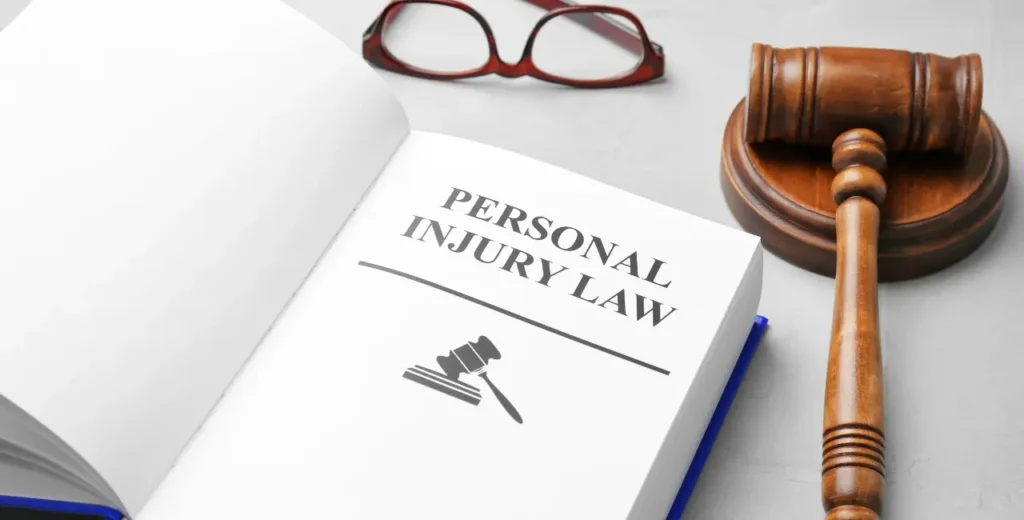
Types of Personal Injury Lawsuits and Verdicts
The term, “personal injury lawsuit,” conjures up different ideas for everybody. Personal injury lawsuits arise when individuals suffer harm due to the negligence, recklessness, or intentional actions of another party. These cases cover a wide spectrum of incidents, and the resulting verdicts can vary based on the circumstances and the legal arguments presented. This article delves into different types of personal injury lawsuits and explores the range of verdicts that can be reached in pursuit of justice.

Table of Contents
What Is a Personal Injury Lawsuit
A personal injury lawsuit is a legal action filed by an individual (the plaintiff) who has suffered harm or injury due to the negligence or wrongful conduct of another party (the defendant). These lawsuits are usually filed with the goal of seeking compensation for the damages incurred as a result of the injury. Personal injury cases can refer to a a wide range of incidents, including car accidents, slip and falls, medical malpractice, product defects, workplace accidents, and more.
What Is a Personal Injury Lawyer?
A personal injury lawyer is a legal professional specializing in providing legal representation to individuals who have suffered physical or psychological injuries due to the negligence or wrongful actions of others. These attorneys are well-versed in tort law and work to help their clients seek compensation for damages such as medical expenses, lost wages, pain and suffering, and other related losses.
Personal injury lawyers navigate the complex legal process, conducting investigations, gathering evidence, negotiating with insurance companies, and, if necessary, litigating in court to ensure their clients receive fair and just compensation for the harm they have endured. Their primary objective is to advocate for the rights of the injured party and pursue legal remedies to help them rebuild their lives after an accident or injury.
Types of Personal Injury Lawsuits
Think of the phrase “personal injury lawsuits” as an umbrella term—there are many different incidents that fall under it.
Motor Vehicle Accidents
Motor vehicle accidents, including car crashes, motorcycle collisions, and truck accidents, are one of the most common types of personal injury lawsuits. A strong case for a motor vehicle accident personal injury lawsuit hinges on the principle that those responsible for causing harm through negligence or wrongful actions should be held accountable.
In these cases, the plaintiff must establish that the defendant acted negligently or engaged in wrongful conduct directly caused the injuries that happened as a result. Establishing a clear connection between the defendant's behavior and the resulting harm is crucial.
Slip and Fall Cases
Slip and fall accidents typically are a result of hazardous conditions like wet floors, uneven surfaces, or poorly maintained premises. In these cases, the plaintiff must prove that the property owner was negligent in maintaining the area and in properly warning others about the risks (Think inadequate signage, poor lighting, or other unsafe conditions).
These cases are premised on the fact that property owners or occupiers owe a duty of care to visitors or patrons on their premises, and that means they are expected to take reasonable steps to ensure the property is safe and free from hazards that could cause harm.
Product Liability Claims
Product liability lawsuits arise when individuals are harmed by defective or dangerous products, and are meant to serve two purposes: To give the plaintiff the compensation they deserve, and to hold manufacturers, distributors, and sellers accountable for the safety of the products they bring to the market This can include everything from malfunctioning electronics to unsafe pharmaceuticals.
In a product liability claim, the plaintiff needs to prove that the product in question was defective or unreasonably dangerous. Keep in mind that product liability cases often operate under the principle of strict liability: The injured party does not need to prove negligence on the part of the manufacturer or seller, just that the product was defective and that the defect caused the injuries.
Medical Malpractice Lawsuits
As you’ve probably guessed, medical malpractice cases arise when a patient suffers harm or injury due to the negligent or substandard care provided by a healthcare professional, including doctors, nurses, surgeons, and other medical practitioners.
These lawsuits depend on the concept of standard of care, which is the ability to establish that
the healthcare provider owed the plaintiff a duty of care and that this duty was breached. This involves demonstrating that the medical professional deviated from the accepted standard of care applicable to their field. This may involve errors in diagnosis, treatment, surgery, medication administration, or inadequate communication.
Workplace Injuries
Workplace injuries can result in personal injury lawsuits, especially if the injury is due to employer negligence or unsafe working conditions. Workers' compensation may cover some costs, but in cases of gross negligence, personal injury claims may lead to additional compensation for damages.
These personal injury cases can be complex, involving both workers' compensation laws and personal injury legal principles. A seasoned personal injury attorney with expertise in workplace injuries is crucial for individuals navigating these cases to ensure they receive compensation for their injuries and losses.
Assault and Battery Cases
Personal injury lawsuits aren’t always a result of an accidental injury; they can also arise from intentional actions, such as assault and battery.
Assault refers to the intentional act of causing someone to fear bodily harm, or the threat of bodily harm. It doesn't necessarily involve physical contact, it includes anything that creates a reasonable fear of harm, such as threats, menacing gestures, or any behavior that instills fear of impending harm.
Battery, on the other hand, involves the intentional and unlawful physical contact with another person, resulting in harm or injury. Unlike assault, battery requires actual physical contact, and the harm caused can range from minor injuries to severe bodily harm.
Both assault and battery require intent in the context of personal injury lawsuits. The perpetrator must have intended to cause the victim to fear harm or to physically injure them.
In cases of assault and battery, criminal charges may be brought against the perpetrator by law enforcement. At the same time, the injured party may pursue a civil personal injury lawsuit seeking compensation for their injuries and damages. The outcomes of criminal and civil proceedings are independent of each other.
Wrongful Death Claims
If someone dies as a result of the negligent, reckless, or intentional actions of another person, a wrongful death claim may be the result. Unlike other personal injury cases where the injured party seeks compensation for their own injuries, a wrongful death claim is brought on behalf of the deceased person by their surviving family members or representatives. These cases are rooted in the concept that certain actions or negligence led to a loss of life, and the responsible party should be held accountable.
Dog Bites and Animal Attacks
Many jurisdictions have laws imposing strict liability on dog owners for injuries caused by their pets. This means that, regardless of the dog's previous behavior or the owner's knowledge of aggression, the owner may be held liable for injuries resulting from a bite or attack.
Some cases may also be pursued on the grounds of negligence. This involves proving that the owner failed to take reasonable precautions to prevent the dog bite or animal attack, such as not properly restraining the animal or allowing it to roam freely.
In many cases, compensation for dog bite injuries may be covered by the owner's homeowner's insurance policy. The injured party might be able file a claim with the insurance company to seek compensation for their injuries.
Potential Outcomes of A Personal Injury Lawsuit
While each case is unique, understanding the potential outcomes can help plaintiffs navigate the legal process with greater clarity. An experienced personal injury attorney can help you understand the likely outcomes of your particular case, and how they will go about building an argument for them.
Settlements
Maybe the most common outcome of a personal injury lawsuit is a settlement. In many cases, parties involved opt to negotiate and reach a settlement before the case even goes to trial. A settlement allows for a resolution without the need for a lengthy court battle.
The terms of the settlement often involve a monetary compensation amount that the defendant agrees to pay the plaintiff in exchange for dropping the lawsuit.
Verdicts After Trial
If a settlement cannot be reached, though, the case may proceed to trial. Here, a judge or jury will hear the evidence presented by both sides and make a determination. The verdict may be in favor of the plaintiff, resulting in a monetary award, or in favor of the defendant, absolving them of liability. The outcome depends on the strength of the evidence, legal arguments, and the persuasive skills of the legal representatives.
Monetary Compensation
In successful personal injury lawsuits, the plaintiff is often awarded monetary compensation, also known as damages. Damages may include both economic damages (such as medical expenses, lost wages, and property damage) and non-economic damages (such as pain and suffering, emotional distress, and loss of consortium). The amount awarded varies based on the severity of the injury, the impact on the plaintiff's life, and other relevant factors.
Appeals
After a trial, either party may choose to appeal the verdict if they believe legal errors occurred during the proceedings. Appeals can lead to a review of the case by a higher court, potentially resulting in the verdict being upheld, modified, or overturned.
Alternative Dispute Resolution (ADR)
In addition to traditional litigation, personal injury cases may undergo alternative dispute resolution (ADR) methods, such as mediation or arbitration. These processes aim to resolve disputes outside of the courtroom, with a neutral third party facilitating negotiations or rendering a binding decision.
Final Word: Types of Personal Injury Lawsuits and Verdicts
Personal injury lawsuits cover a broad spectrum of incidents, and a wide variety of outcomes depending on the specific circumstances, the evidence presented, and the legal arguments made. Whether seeking compensation for medical expenses, lost wages, or emotional distress, those pursuing personal injury lawsuits should consult experienced attorneys who can help them best understand what kind of lawsuit to bring, if one is necessary at all, and what compensation might be rewarded.
Set up your free initial 30-minute legal consultation with Van Camp, Meacham & Newman either online, or by calling us at 910-295-2525.
Disclaimer: The information seen on this website, including the article above, is not legal advice or legal counsel. If you wish to speak to a personal injury lawyer, contact our North Carolina attorneys directly using our online form or by calling 910-295-2525. While our law firm is located in North Carolina, our attorneys have tried cases and work with clients across the country, from Raleigh, Fayetteville, Pinehurst, and Sanford, to Virginia, Illinois, Oregon, and California to Florida. Call our experienced attorneys today.

